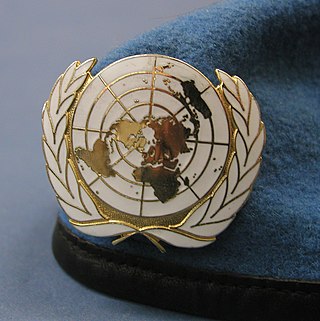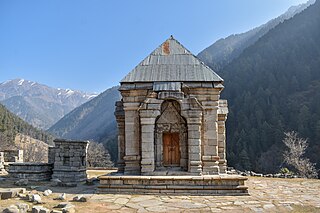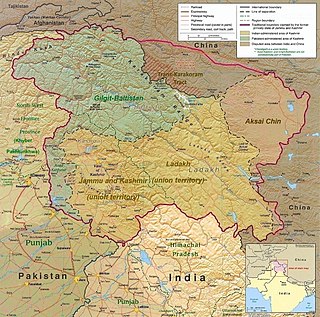The Karachi Agreement of 1949 was signed by the military representatives of India and Pakistan, supervised by the United Nations Commission for India and Pakistan, establishing a cease-fire line in Kashmir following the Indo-Pakistani War of 1947. It established a cease-fire line which has been monitored by United Nations observers from the United Nations since then.

The Kashmir conflict is a territorial conflict over the Kashmir region, primarily between India and Pakistan, and also between China and India in the northeastern portion of the region. The conflict started after the partition of India in 1947 as both India and Pakistan claimed the entirety of the former princely state of Jammu and Kashmir. It is a dispute over the region that escalated into three wars between India and Pakistan and several other armed skirmishes. India controls approximately 55% of the land area of the region that includes Jammu, the Kashmir Valley, most of Ladakh, the Siachen Glacier, and 70% of its population; Pakistan controls approximately 30% of the land area that includes Azad Kashmir and Gilgit-Baltistan; and China controls the remaining 15% of the land area that includes the Aksai Chin region, the mostly uninhabited Trans-Karakoram Tract, and part of the Demchok sector.
The following is a timeline of the Kashmir conflict, a territorial conflict between India, Pakistan and, to a lesser degree, China. India and Pakistan have been involved in four wars and several border skirmishes over the issue.

The United Nations has played an advisory role in maintaining peace and order in the Kashmir region soon after the independence and partition of British India into the dominions of Pakistan and India in 1947, when a dispute erupted between the two new States on the question of accession over the princely state of Jammu and Kashmir. India took this matter to the UN Security Council, which passed resolution 39 (1948) and established the United Nations Commission for India and Pakistan (UNCIP) to investigate the issues and mediate between the two new countries. Following the cease-fire of hostilities, it also established the United Nations Military Observer Group in India and Pakistan (UNMOGIP) to monitor the cease-fire line.

United Nations Security Council Resolution 39, adopted on January 20, 1948, offered to assist in the peaceful resolution of the Kashmir Conflict by setting up a commission of three members; one to be chosen by India, one to be chosen by Pakistan and the third to be chosen by the other two members of the commission. The commission was to write a joint letter advising the Security Council on what course of action would be best to help further peace in the region.

United Nations Security Council Resolution 47, adopted on 21 April 1948, concerns the resolution of the Kashmir conflict. After hearing arguments from both India and Pakistan, the Council increased the size of the UN Commission created by the former Resolution 39 to five members, instructed the Commission to go to the subcontinent and help the governments of India and Pakistan restore peace and order to the region and prepare for a plebiscite to decide the fate of Kashmir.

United Nations Security Council Resolution 80, adopted on March 14, 1950, having received the reports of the Commission for India and Pakistan, as well as a report from General A. G. L. McNaughton, the Council commended India and Pakistan for their compliance with the ceasefire and for the demilitarization of Jammu and Kashmir and agreement on Fleet Admiral Chester W. Nimitz as the future Plebiscite Administrator.

United Nations Security Council Resolution 91, adopted on March 30, 1951, noting a report by Sir Owen Dixon, the United Nations Representative for India and Pakistan, stating that the main point of difference of preparing the state of Jammu and Kashmir for the holding of a plebiscite were as follows; the procedure for and extent of demilitarization, the degree of control over the exercise of the functions of government necessary to ensure a free and fair plebiscite.

United Nations Security Council Resolution 96, adopted on November 10, 1951, having received a report by Mr. Frank Graham, the United Nations representative for India and Pakistan, as well as hearing his speech before the Council a basis for a program of demilitarization was noted with approval. The Council noted with gratification the declaration by both India and Pakistan that they would work for a peaceful settlement, continue to observe a cease-fire and accepted the principle that the accession of the State of Jammu and Kashmir should be determined by a free and impartial plebiscite under the auspices of the United Nations. The Council then instructed the UN Representative to continue in his efforts to obtain agreement of the parties on a plan for effecting the demilitarization of the State of Jammu and Kashmir and to report back on his efforts together with his view concerning the problems confided to him within six weeks.

United Nations Security Council Resolution 123 was adopted on February 21, 1957, after the conflict over Jammu and Kashmir intensified. The council requested that the President of the Security Council visit the subcontinent and, along with the governments of India and Pakistan, examine any proposals which were likely to contribute to the resolution of the dispute. The council requested that he report back to them no later than April 15, and the resulting report formed the basis of United Nations Security Council Resolution 126, which was adopted in December of the same year.

United Nations Security Council Resolution 126 was adopted on 2 December 1957. It was the last of three resolutions passed during 1957 to deal with the dispute between the governments of India and Pakistan over the territories of Jammu and Kashmir. It followed a report on the situation by Gunnar Jarring, representative for Sweden which the council had requested in resolution 123. It requests that the governments of India and Pakistan refrain from aggravating the situation, and instructs the United Nations Representative for India and Pakistan to visit the subcontinent and report to the council with recommended action toward further progress.

United Nations Security Council Resolution 303, adopted on December 6, 1971, after a lack of unanimity at the 1606th and 1607th meetings of the Council prevented it from exercising its primary responsibility, the Council decided to refer the question to the General Assembly.

United Nations Security Council Resolution 307, adopted on December 21, 1971, after hearing statements from India and Pakistan, the Council demanded that a durable cease-fire be observed until withdrawals could take place to respect the cease-fire line in Jammu and Kashmir. The council also called for international assistance in the relief of suffering and rehabilitation of refugees as well as their return home and a request for the Secretary-General to keep the council informed on developments.

The Constituent Assembly of Jammu and Kashmir was a body of representatives elected in 1951 to formulate the constitution of Jammu and Kashmir. The Constituent Assembly was dissolved on 26 January 1957, based on Mir Qasim resolution it adopted and ratified the constitution of jammu and kashmir on 17 November 1956.
The All Jammu and Kashmir Plebiscite Front, or Plebiscite Front, was a political party in the Indian state of Jammu and Kashmir that called for a "popular plebiscite" to decide if the state should remain part of India, join Pakistan or become independent. The patron of the party was Sheikh Abdullah, the former Prime Minister of Jammu and Kashmir and chief of the Jammu and Kashmir National Conference, even though he never formally joined it. The founder of the party was Mirza Afzal Beg.
Pakistan officially joined the United Nations (UN) on 30 September 1947 just over a month after it came into existence. Today, it is a charter member and participates in all of the UN's specialised agencies and organisations. Pakistan has been elected seven times into the UN Security Council, with the most recent term in 2013. It is also one of the countries which has had a diplomat, Muhammad Zafarullah Khan, serve a term as the President of the United Nations General Assembly.

The history of Azad Kashmir, a disputed part of the Kashmir region currently administered by Pakistan, is related to the history of the Kashmir region during the Dogra rule. Azad Kashmir borders the Pakistani provinces of Punjab and Khyber Pakhtunkhwa to the south and west respectively, Gilgit–Baltistan to the north, and the Indian union territory of Jammu and Kashmir to the east. The region is claimed by India and has been the subject of a dispute between India and Pakistan since 1947.
Elections for the Constituent Assembly of the Indian state of Jammu and Kashmir were held in September–October 1951. Sheikh Abdullah was appointed Prime Minister of Jammu and Kashmir. Following frictions with various groups such as the Jammu Praja Parishad agitation, Abdullah was dismissed in August 1953 and imprisoned. Bakshi Ghulam Mohammad was appointed as the next prime minister.
Peacebuilding in Jammu and Kashmir includes confidence-building measures at a nation-state level between the governments of India and Pakistan, track two diplomacy, as well as initiatives by non-governmental organisations (NGOs), institutes and individuals. The purpose of peacebuilding in Jammu and Kashmir include conflict prevention and reduction of hostilities in the Kashmir Valley. Many countries such as Russia, United States and China have also played a de-escalatory role with regard to tensions in the region.

The Jammu and Kashmir Reorganisation Act, 2019 is an act of the parliament of India containing provisions to reconstitute the Indian-administered state of Jammu and Kashmir into two Indian-administered union territories (UTs) called Jammu and Kashmir, and Ladakh, and becoming effective on 31 October 2019. A bill for the act was introduced by the Minister of Home Affairs, Amit Shah, in the Rajya Sabha on 5 August 2019 and was passed on the same day. It was then passed by the Lok Sabha on 6 August 2019 and it received the president's assent on 9 August 2019.










